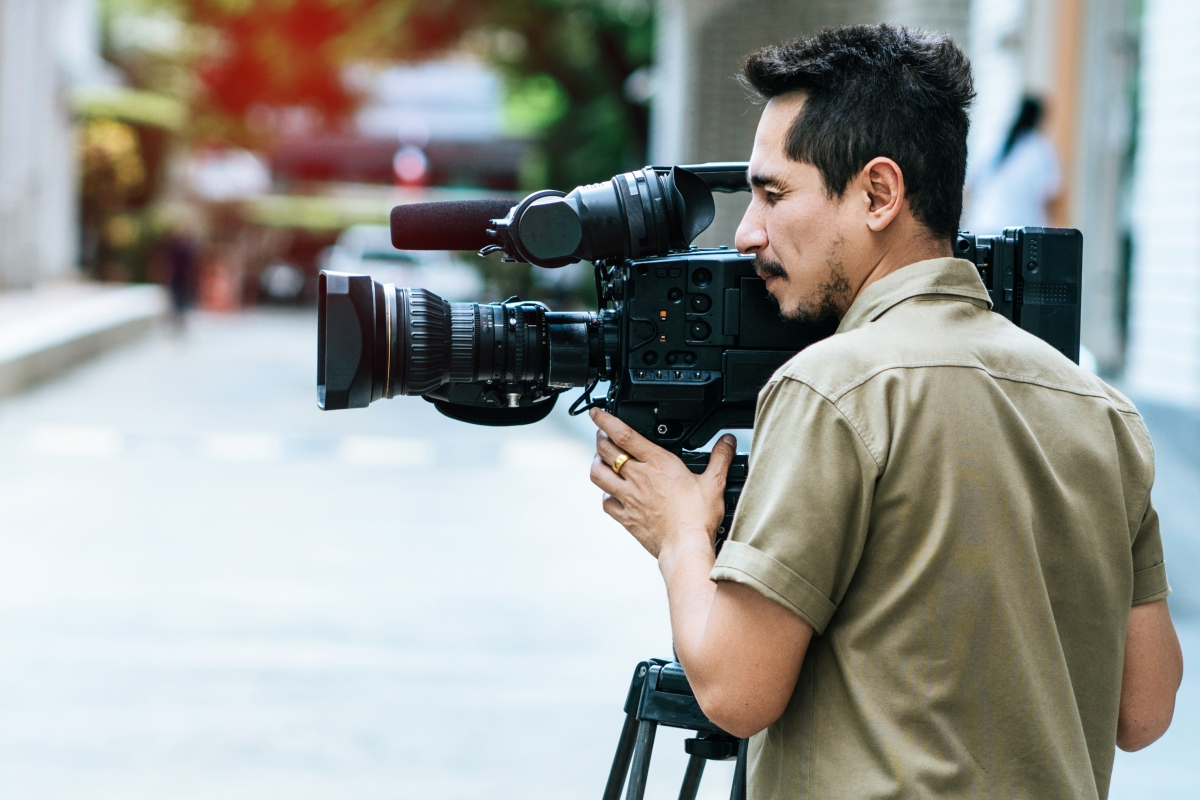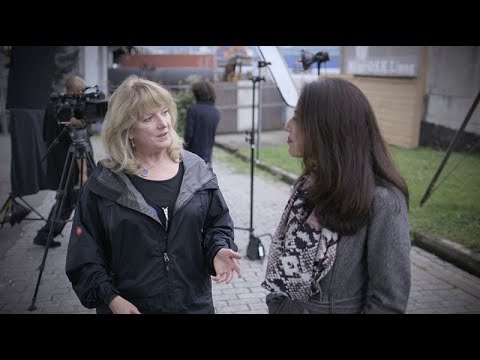Career Overview
Film and video camera operators work with film, video and digital media cameras and related equipment and technology. They record news, events, movies, television shows and other activities – including online productions. They often produce livestream videos, allowing people to watch events, meetings and other activities in real time online.
Job Titles
Duties
Film and video camera operators:
- Meet with producers, news directors and senior members of video production crew to:
- Discuss assignments
- Plan camera movements, picture compositions and lighting conditions
- Find good locations for filming, video sequences and interviews
- Select what type of camera, lens and filters to use
- Adjust focus, exposure, lighting and other camera settings
- Operate cameras to record news, live events, interviews, movies, videos and television, cable and online broadcasts
- Test, maintain and store equipment
- If using film, label and record the contents of exposed film
- If using video or digital media, complete their report sheets, label, manage and organize the recordings or digital media files
- May meet with clients to discuss the project
- May be required to follow the movie or television series’ director’s instructions on set
Earnings
Earnings is income that workers receive in exchange for their labour. Depending on the type of employment, earnings can be in the form of wages (hourly), salaries (fixed monthly or annual) or self-employed earnings.
Work Environment
# Workers Employed
975% Employed Full Time
27%Film and video camera operators may work for television networks, stations and cable outlets delivering content across platforms, such as online, television and film. Corporate advertising and marketing agencies, video production houses, government and other organizations may have in-house camera operators. Also, online producers often create their own content for social media channels, such as YouTube and TikTok.
Camera operators may work for production houses on documentaries, television shows or movies. Some may own their business or work on contract or freelance.
Those who work for television and cable networks, advertising or marketing agencies, corporations or government usually work a 40-hour week. They may be required to work on weekends for specific projects or events. Other assignments may require camera operators to work long, irregular hours on short notice.
Some camera operators may work indoors in production/broadcast studios. They may also work outside depending on the location/set. Often, camera operators travel, either locally or to distant places, to set up and secure interviews and footage.
Many camera operators wait long hours in varying weather conditions for an event to take place and must stand or walk for long periods while carrying heavy equipment. Camera operators who cover news events may be required to work in uncomfortable or dangerous surroundings such as accidents, natural disasters and military conflicts. Camera operators who work on location must be able to get their work done efficiently and might not have easy access to internet, printers or other tools that are readily available in urban areas.
Career Pathways
With experience and training, camera operators may progress to supervisory roles or to director of photography positions. They may also start their own business or establish themselves as a senior news videographer or as the head of in-house video/digital production for a large corporation.
Occupational Interests
It’s important to understand what kinds of occupations align with your interests.
For more about occupational interests visit Skills for the Future Workforce > Characteristics.
Here are the top occupational interest(s) for this career profile:
Education, Training and Skills
Film and video camera operators generally need to graduate from a college or technical program in broadcasting, audio-visual technology or a related field. Other requirements usually include:
- Experience as a camera assistant
- A portfolio of work to demonstrate creative and technical ability to employers
It’s also important for film and video camera operators to:
- Be creative and detail oriented
- Have good organizational and communication skills and be able to work under deadlines
- Have good eyesight and co-ordination
Education programs in B.C.

Top Skills
Every job calls for a certain set of skills. Knowing those skills is the first step in finding a good career fit.
Here, you will find the 10 most relevant workplace skills. Some are more important to achieving success in a certain career than others. These skills may come naturally to you or you may need to gain them through education, training and experience.
See the list of work-related skills below, ranked in order of importance for this career. Check out the list and see if this career matches your skills—take that first step!
Giving full attention to what other people are saying, taking time to understand the points being made, asking questions as appropriate, and not interrupting at inappropriate times.
Adjusting actions in relation to others' actions.
Understanding written sentences and paragraphs in work-related documents.
Considering the relative costs and benefits of potential actions to choose the most appropriate one.
Talking to others to share information effectively.
Using logic and reasoning to identify the strengths and weaknesses of alternative solutions, conclusions or approaches to problems.
Keeping track of and assessing your performance, other individuals, or organizations to make improvements or take corrective action.
Being aware of others’ reactions and understanding why they react as they do.
Managing one’s own time and the time of others.
Being able to solve novel, ill-defined problems in complex, real-world settings.
Labour Market Statistics
Discover data, facts and information that have been gathered and analyzed. Learn about the characteristics of the economy and labour market in B.C.
Employment
Find out about employment types and trends by region and industry.
Employment
975Employment by Region







| Region | Employment | % Employment of this Occupation |
|---|---|---|
| Cariboo | 0 | 0.0% |
| Kootenay | 10 | 1.0% |
| Mainland/Southwest | 765 | 78.1% |
| North Coast and Nechako | 0 | 0.0% |
| Northeast | 0 | 0.0% |
| Thompson-Okanagan | 60 | 6.1% |
| Vancouver Island/Coast | 135 | 13.8% |
Labour Market Outlook
The B.C. Labour Market Outlook is a 10-year forecast of the expected supply and demand for labour in the province. It’s usually updated every year. The purpose is to provide British Columbians with the knowledge to make informed decisions on careers, skills training, education and hiring.
Forecasted Job Openings (2025-2035)
400Forecasted Job Openings
Forecasted Employment Growth Rate
Composition of Job Openings
Job Openings by Region (2025-2035)







| Region | Job Openings | Avg. Annual Employment Growth |
|---|---|---|
| Cariboo | Not available | Not available |
| Kootenay | Not available | Not available |
| Mainland/Southwest | 300 | 1.4% |
| North Coast and Nechako | Not available | Not available |
| Northeast | Not available | Not available |
| Thompson-Okanagan | 20 | 1.0% |
| Vancouver Island/Coast | 80 | 2.3% |
Industry Highlights
Learn about the opportunities in B.C.'s major industries, including employment trends, earning potential, locations of work and more.
Forecasted Job Openings by Industry
| Industry | Job Openings (2025-2035) |
|---|---|
| Information, Culture and Recreation | 290 |
| Professional, Scientific and Technical Services | 90 |
| Educational Services | 10 |
| Business, Building and Other Support Services | 10 |
Insights from Industry
Advances in technology have provided opportunities for those interested in a career behind and in front of the camera. Social media start ups often do their own camera work and this gives them creative freedom. Specializing in certain technologies is common. For example, using smartphones to create content or providing expertise in drone operation for filming.
While some productions may use traditional film, for the most part it’s used in artistic work. Most production companies, news organizations and individual camera operators use digital forms of media for videos. Improved technology has allowed digital media to provide quality that is equal to more traditional forms and is easier to store, access and transfer.
There are new opportunities to freelance for media outlets. This is attractive for those who enjoy a fast-paced environment and like to think and produce quickly in challenging circumstances.
Film and video camera operators should have technical, business and people skills for this type of career. They need to keep up to date on what the audience expects. Also, it’s important to troubleshoot any equipment issues to avoid losing time with an interview subject or at an event.
Resources
-
British Columbia Professional Videographers Associationwww.bcpva.com
-
Canadian Association of Broadcasterswww.cab-acr.ca
-
Canadian Film Centre (CFC)www.cfccreates.com
-
Canadian Media Producers Association (CMPA)www.cmpa.ca
-
Creative BCwww.creativebc.com
-
International Cinematographers Guild – Local 669www.ia669.com








